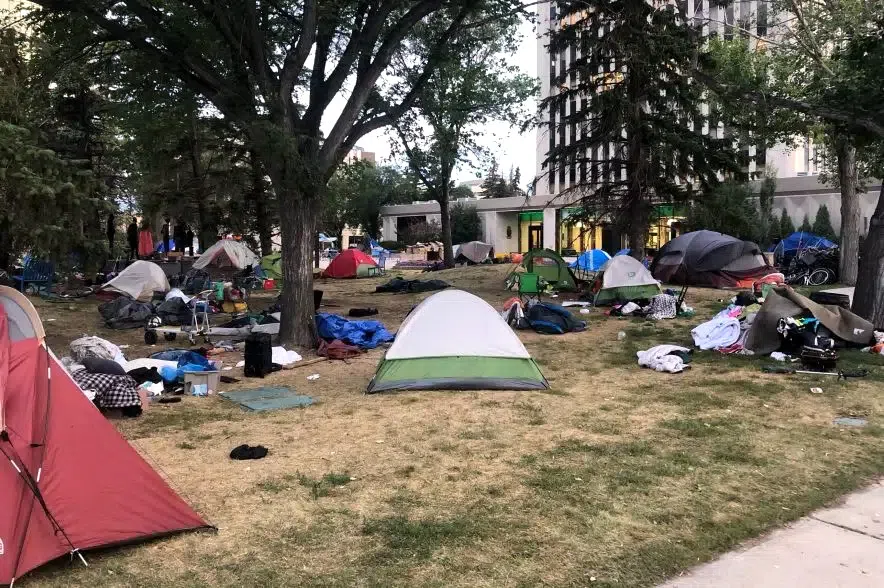More boots on the ground for policing, more addiction beds and expanding urgent care centres — those are among the things the Saskatchewan Urban Municipalities Association (SUMA) liked from the government’s Speech from the Throne this week.
However, the organization was looking for a bit more when it comes to the government’s income support program and its role in the growing homelessness problem in the province.
SUMA has brought up Saskatchewan Income Support (SIS) and Saskatchewan Assured Income for Disability (SAID) before, but CEO Jean-Marc Nadeau said the group still has concerns.
“Municipalities are seeing an increase in mental health and addictions which results in homelessness, and while we’re seeing it more visibly in the large urbans like Regina, Saskatoon, Moose Jaw, P.A. perhaps. We’re also seeing it, maybe less prevalent but, certainly, we’re hearing from our leaders (in smaller centres) that there are issues,” explained Nadeau.
He said places like Meadow Lake and Nipawin are reporting increasing issues.
He said the group’s research with community-based organizations has found the increasing problems are due to the move to an amalgamated SIS program starting in 2019 and the economic realities of the SAID program.
Read more:
- ‘We need a new program’: Poverty advocate sees SIS problems in auditor’s report
- Auditor suggests series of fixes for Saskatchewan Income Support program
- Saskatchewan income benefit increase not enough: Advocate
Nadeau said SUMA hopes for government interest to look at those programs again.
As several advocates have brought up, Nadeau said at least one problem with the SIS program stems from rent no longer being automatically paid directly to the landlord.
“These marginalized individuals have higher rates of refusal at the rent locations, said Nadeau.
“And so, as a result of that, they end up on the streets and couching-surfing, using our municipal infrastructure for personal places to wash and house themselves temporarily and, obviously, those are an added cost to our municipalities that, hopefully, we can resolve in the near future.”
He added that more wrap-around services need to be added to the programs to give people more support, and he said SAID rates are still way too low.
“Just to say that they’re provided a certain amount of money to pay for their rent when they’ve got addictions — I was a police officer for 25 years, I can tell you what they’re going to use the money for,” said Nadeau about the SIS program.
He couldn’t put a particular number on how much money municipalities are putting into helping with these issues but said SUMA is working on getting some of that information.
Conversations with the provincial government on this and other issues are ongoing, according to Nadeau. He said meetings with a number of the new ministers are set for the coming weeks.
Government defending program
The provincial government did not make new Social Services Minister Terry Jenson available for an interview on the issues, sending a statement instead.
The statement defended the SIS and SAID programs, saying benefits in both programs have been increased at a rate higher than inflation in Saskatchewan — three years in a row in the case of SIS, and two years in a row for SAID clients.
After the SIS program was fully implemented, the provincial government put in the ability for clients to have a trustee handle their financial issues, including paying their rent for them.
The ministry’s statement also talked about other programs the government has launched, like the Mobile Outreach Initiative, the Saskatchewan Employment Incentive program, increasing earned income exemptions on the programs, expanding the housing benefit, and making social housing more accessible.
Under the SIS program, the basic benefit for an adult in northern Saskatchewan is $425 a month, while outside the north can get $355, plus $65 a month per child.
The shelter benefit is $650 a month in Saskatoon and Regina for single people, $830 for couples without children, $1,06 for families with up to two kids, and $1,245 for families with three or more kids. The shelter benefit is meant to pay rent or a mortgage, utilities, taxes, and other shelter-related costs.
In the rest of the province, the shelter benefit for singles is $590 a month, $720 for couples without kids, $820 for families with up to two kids, and $925 for families with three or more kids.
Clients under SIS could be eligible for other benefits like short-term emergency assistance, travel benefits for those who need to travel for medical purposes or job interviews, and the licensed child care benefit.
SAID program benefits can depend on the person’s individual needs and disabilities.











